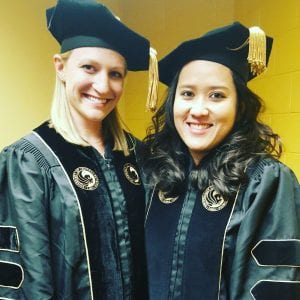Using Data to Tell a Story

The world is changing every day. We have more data than ever to tell us about people and explain incredible phenomena. For two University of Central Florida alumnae, data is being used to change the world for the better.
Sara S. Vega, Ph.D. (left) and Jenny Nguyen (right), Ph.D., both graduated from UCF in May 2016 with their doctoral degrees in sociology. For them, sociology means to systematically examine occurrences of daily life and make larger, more scientific conclusions about the ways groups behave and interact.
“I was always interested in social problems and inequality,” Nguyen said. “Sociology challenged me to question how existing institutions in our society reproduce inequality and how social research can be a used to respond to these issues.”
Nguyen and Vega share the same belief that data from institutions can be used to help people. They worked well together in the Ph.D. program, so they decided to take their passion to the next level and start a research firm. In October 2016, Vega Nguyen Research Firm, LLC, was open for business – just five months after graduation.
“Through our various data analysis courses and papers, we realized there was so much data out there, yet organizations and agencies do not have the resources to uncover the story their data is trying to tell,” Vega said.
Their company focuses on offering services in statistical analysis, survey research, data set management and report writing at a reasonable cost to institutions and organizations of all sizes. They strive to make everyone who is involved in their projects as committed to the end result as possible.
“Our firm provides a one-on-one experience where trust can be built, and we can share the passion our clients have for their project,” Nguyen said. “We feel this trust between the researcher and the client means a better product is delivered that ultimately exceeds client expectations.”
Vega Nguyen Research Firm, LLC, started small by initially reaching out to exclusively non-profit, educational organizations, private businesses and individuals for consultations. The commitment to everyone involved allows them to connect with clients and build relationships across the globe.
“For one of our first projects we worked with a non-profit, The Other Side of Service, based out of DC,” Vega said. “The agency works to decrease the underemployment of military spouses. Despite the CEO being in Atsugi, Japan, we built a trusting relationship via teleconferencing and email, and provided this organization with useful analysis to further their effort.”
Receiving their education at UCF helped them become committed to the community. They followed the example set by the Department of Sociology. The department hosts many professors who shared this commitment while they attended the Ph.D. program. The department also holds itself, its research and its graduate students to a high standard.
“Our experience at UCF means we hold ourselves as researchers, and the products we produce, to the same rigorous standards we were taught to hold throughout our Ph.D. program,” Vega said.
“Like UCF, we share the goal of being active members of the communities that our team members live in,” Nguyen said. “As a remote company, we make impacts on areas around the globe by working directly with the people in our community and sharing our expertise with others remotely.”
Their training in social science research, statistics, and theory from UCF provided an advantage when starting their own research firm – a firm that aims to produce valuable research that will impact real people.
“The most exciting thing for us is to see an agency or institution take the reports and analyses we provide and put them to use to improve the lives of others,” Vega explained. “For that reason, our motto is: Finding data to tell your story. To us, data are stories waiting to be told and voices that need to be heard.”
